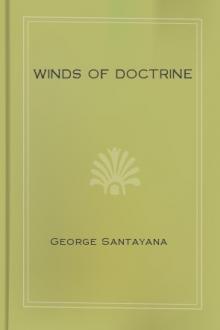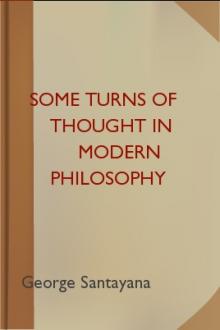author - "George Santayana"

ine arts, however, and in religion and philosophy, we are still in full career towards disintegration. It might have been thought that a germ of rational order would by this time have penetrated into fine art and speculation from the prosperous constructive arts that touch the one, and the prosperous natural and mathematical sciences that touch the other. But as yet there is little sign of it. Since the beginning of the nineteenth century painting and sculpture have passed through several

nclusions beforehand into the acceptable and the inacceptable, the edifying and the shocking, the noble and the base. Wonder has no longer been the root of philosophy, but sometimes impatience at having been cheated and sometimes fear of being undeceived. The marvel of existence, in which the luminous and the opaque are so romantically mingled, no longer lay like a sea open to intellectual adventure, tempting the mind to conceive some bold and curious system of the universe on the analogy of

hile life as a whole, history, character, and destiny are objects unfit for imagination to dwell on, and repellent to poetic art? I cannot think so. If it be a fact, as it often is, that we find little things pleasing and great things arid and formless, and if we are better poets in a line than in an epic, that is simply due to lack of faculty on our part, lack of imagination and memory, and above all to lack of discipline.This might be shown, I think, by psychological analysis, if we cared to

es sleep because it has a dormitive virtue. The virtues or moral uses of things, according to Socrates, were the reason why the things had been created and were what they were; the admirable virtues of opium defined its perfection, and the perfection of a thing was the full manifestation of its deepest nature. Doubtless this moral interpretation of the universe had been overdone, and it had been a capital error in Socrates to make that interpretation exclusive and to substitute it for natural

the Life ofReason, if it were brought to perfection, intelligence would be at oncethe universal method of practice and its continual reward. Allreflection would then be applicable in action and all action fruitful inhappiness. Though this be an ideal, yet everyone gives it from time totime a partial embodiment when he practises useful arts, when hispassions happily lead him to enlightenment, or when his fancy breedsvisions pertinent to his ultimate good. Everyone leads the Life ofReason in so

his expressiveness of the sky is due to certain qualities of the sensation, which bind it to all things happy and pure, and, in a mind in which the essence of purity and happiness is embodied in an idea of God, bind it also to that idea.So it may happen that the most arbitrary and unreal theories, which must be rejected as general explanations of aesthetic life, may be reinstated as particular moments of it. Those intuitions which we call Platonic are seldom scientific, they seldom explain the

ine arts, however, and in religion and philosophy, we are still in full career towards disintegration. It might have been thought that a germ of rational order would by this time have penetrated into fine art and speculation from the prosperous constructive arts that touch the one, and the prosperous natural and mathematical sciences that touch the other. But as yet there is little sign of it. Since the beginning of the nineteenth century painting and sculpture have passed through several

nclusions beforehand into the acceptable and the inacceptable, the edifying and the shocking, the noble and the base. Wonder has no longer been the root of philosophy, but sometimes impatience at having been cheated and sometimes fear of being undeceived. The marvel of existence, in which the luminous and the opaque are so romantically mingled, no longer lay like a sea open to intellectual adventure, tempting the mind to conceive some bold and curious system of the universe on the analogy of

hile life as a whole, history, character, and destiny are objects unfit for imagination to dwell on, and repellent to poetic art? I cannot think so. If it be a fact, as it often is, that we find little things pleasing and great things arid and formless, and if we are better poets in a line than in an epic, that is simply due to lack of faculty on our part, lack of imagination and memory, and above all to lack of discipline.This might be shown, I think, by psychological analysis, if we cared to

es sleep because it has a dormitive virtue. The virtues or moral uses of things, according to Socrates, were the reason why the things had been created and were what they were; the admirable virtues of opium defined its perfection, and the perfection of a thing was the full manifestation of its deepest nature. Doubtless this moral interpretation of the universe had been overdone, and it had been a capital error in Socrates to make that interpretation exclusive and to substitute it for natural

the Life ofReason, if it were brought to perfection, intelligence would be at oncethe universal method of practice and its continual reward. Allreflection would then be applicable in action and all action fruitful inhappiness. Though this be an ideal, yet everyone gives it from time totime a partial embodiment when he practises useful arts, when hispassions happily lead him to enlightenment, or when his fancy breedsvisions pertinent to his ultimate good. Everyone leads the Life ofReason in so

his expressiveness of the sky is due to certain qualities of the sensation, which bind it to all things happy and pure, and, in a mind in which the essence of purity and happiness is embodied in an idea of God, bind it also to that idea.So it may happen that the most arbitrary and unreal theories, which must be rejected as general explanations of aesthetic life, may be reinstated as particular moments of it. Those intuitions which we call Platonic are seldom scientific, they seldom explain the